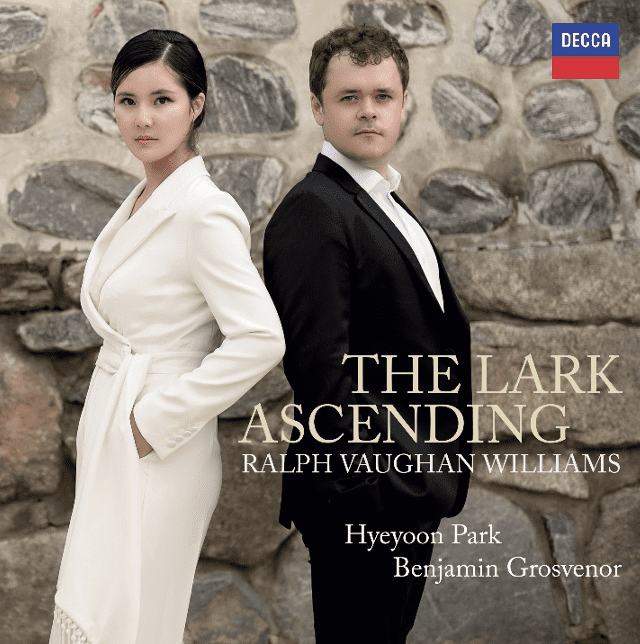THE ORIGINAL VERSION OF THE LARK ASCENDING RECORDED TO CELEBRATE VAUGHAN WILLIAMS’ 150th ANNIVERSARY
REDISCOVERING THE NATION’S FAVOURITE PIECE OF CLASSICAL MUSIC

HYEYOON PARK & BENJAMIN GROSVENOR RELEASE NEW RECORDING OF OFTEN OVERLOOKED ARRANGEMENT FOR VIOLIN AND PIANO
7 OCTOBER 2022 (TORONTO, ON) – Ralph Vaughan Williams’ The Lark Ascending is commonly regarded as the nation’s favourite piece of classical music. This year, it topped the annual Classic FM Hall of Fame poll for a record 12th time. Whilst listeners are familiar with the version for solo violin and orchestra, it is not well known that the beloved composition was originally scored for violin and piano accompaniment, with the orchestral version following several years later.
To celebrate the 150th anniversary of Ralph Vaughan Williams’ birth (12th October), violinist Hyeyoon Park and pianist Benjamin Grosvenor have today released a new version of the original arrangement for solo violin and piano.
Tom Lewis and Laura Monks, Co-Presidents of Decca Label Group, say,
“Anyone who loves The Lark Ascending, needs to pause for a moment, close their eyes and press play. This recording, performed as originally written by Vaughan Williams, paints such vivid pictures in your mind. It is a little know fact that it was originally conceived for violin and piano. And we are so proud that Decca is the first major label to record this. What a way to celebrate the birth of one of Britain’s greatest ever composers”
Hyeyoon Park says,
“While this arrangement was actually written by Vaughan Williams before the familiar version with orchestra, it sounds to our ears like a transcription. With the timbre of the piano, it is somehow like a black and white photograph – creating new perspectives and different atmospheres.”
With The Lark Ascending, Vaughan Williams was inspired by George Meredith’s 1881 poem of the same name, a paean to the flight and song of the skylark. The piece exemplifies the composer’s signature pastoral, folk-inspired style, capturing the skylark’s ascent in music.
Whilst preparing to record The Lark Ascending, Hyeyoon Park was eager to witness the natural phenomenon that inspired the work. She says,
“I had hoped to witness the majestic spectacle that inspired it, and had the happy fortune to do so on a long Kentish walk in June over the Jubilee weekend. When I was starting to get tired after having walked for about three hours, I took a rest in a vast field. There was a trill-like, piercing song and as I looked up, a small bird was ascending level by level while maintaining an elaborate cry. When it reached a great height - remarkable for such a small bird - it hovered freely, as if finally unfettered after the arduous climb and fond of the view of its little kingdom. This sequence of images has been imprinted on my mind and definitely inspired my interpretation of this piece. I hope you can also visualise my experience when you hear this recording!”
Hyeyoon Park (pronounced Hay-yoon) and Benjamin Grosvenor have a long-running musical friendship and understanding, described as “a world class duo” by the Sueddeutsche Zeitung. Their first post-lockdown performance, live streamed in 2020 from an empty Wigmore Hall was a powerful moment. The Guardian wrote: “No empty hall could sound more still… it was practically flawless.”
Benjamin Grosvenor is one of the most celebrated musicians of his generation, hailed by The Independent as “one in a million…several million”. Among other accolades, his Decca discography has received multiple Gramophone Awards. Hyeyoon Park is an artist of outstanding style and virtuosity, achieving international acclaim with many of the planet’s leading orchestras, with Neue Westfälische describing her violin skills as “extraordinary; they are almost perfect. Her technique and control are breath-taking, resulting in some highly focused music-making.”
The Lark Ascending is out now on Decca Classics ahead of the 150th anniversary of Ralph Vaughan Williams’ birth on 12 October.
The release adds to national “RVW150” celebrations recognizing the composer’s legacy.